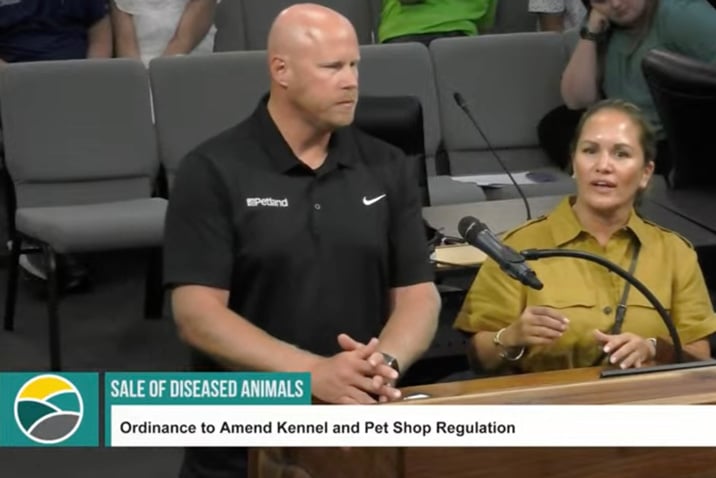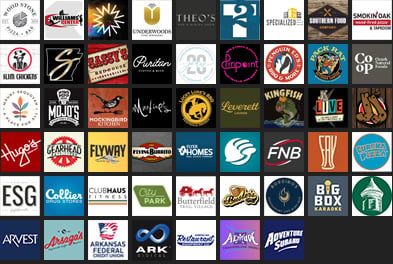 Justine Lentz, the city’s animal services superintendent, speaks at the City Council’s agenda-setting session on July 12, 2022. (Fayetteville Government Channel)
Justine Lentz, the city’s animal services superintendent, speaks at the City Council’s agenda-setting session on July 12, 2022. (Fayetteville Government Channel)FAYETTEVILLE — A lawsuit has halted the city’s recent ban on dog and cat sales.
The complaint, filed last week in Benton County Circuit Court against the city on behalf of Petland owners Boyle Ventures, included a temporary restraining order that prevents enforcement of the city’s new ordinance, which was set to go into effect Saturday. It also seeks damages and attorney fees.
The City Council last month voted unanimously to approve the measure, which prohibits the retail sale of dogs and cats unless they are first obtained from and in cooperation with the city’s animal shelter or another animal rescue organization.
The decision was made shortly after signs went up in north Fayetteville for a new Petland store, which is part of a franchise that sells puppies and kittens. No other shops sell dogs and cats in Fayetteville. The city’s two largest pet stores – Petco and Petsmart – have corporate mandates against the sale of dogs and cats.
Justine Lentz, the city’s animal services superintendent, said the idea for a ban was first discussed by the city’s Animal Services Advisory Board after a Petland pet store opened in Rogers in 2019. Lentz told the council the franchise has been accused of selling animals that were raised in large-scale, commercial breeding facilities, and since the Rogers store has opened, it has been associated with backlash from customers who said they purchased sick puppies with a variety of health issues from severe worms to Parvo.
Letnz said knowing there was a Fayetteville store in the works, she wanted the council to act quickly in passing the ordinance.
Fayetteville Petland franchise owner Samantha Boyle, who also owns the Rogers location and one other store in Joplin, Missouri, asked the council to reject the proposal and said the claims about her Rogers store were unsubstantiated.
Before the vote, council members said their decision was not based on any specific business, but rather was an effort to ensure the safety of animals.
At the time, City Attorney Kit Willams said he thought the council had made a reasonable decision to prevent a new outlet from selling animals raised in poor conditions. He said he knew there was a potential for pushback from Petland, but he was confident that the ordinance was in compliance with state law.
“I realized that the City of Fayetteville could be threatened with numerous claims if the City Council passed the ordinance,” he wrote in a Aug. 11 memo to the mayor and council. “However…I thought the City could withstand all those attacks.”
 Ryan and Samantha Boyle, owners of a local Petland franchise, speak at the City Council meeting on July 19, 2022. (Fayetteville Government Channel)
Ryan and Samantha Boyle, owners of a local Petland franchise, speak at the City Council meeting on July 19, 2022. (Fayetteville Government Channel)Williams said a few days after the vote, he was contacted by an attorney representing Petland who outlined some arguments for why the new measure wasn’t valid. After researching each claim, Williams said his initial confidence was reaffirmed.
But a second attorney email referenced a new state statute passed in 2021 (Ark. Code § 14-54-1105) regarding the regulation of working animals. And while Williams said he thinks it’s clear that animals sold at pet stores aren’t inherently defined as working animals, the statute includes some wording that could put Fayetteville’s new ordinance at risk.
The language states: “An ordinance or resolution shall not be enacted by a municipality that terminates, bans, effectively bans, or creates an undue hardship relating to the job or use of a working animal or animal enterprise in commerce…”
Williams said it’s the reference to “animal enterprise in commerce” that is concerning.
“Could this reasonably mean a pet store?” he asked. “It remains somewhat unclear what ‘animal enterprise’ means. If the Legislature meant ‘pet store,’ why did it not use that term?”
The Legislature excluded some animals from its definition, including poultry, swine, dairy cows, beef cattle, sheep and goats. The language did not exclude dogs, cats or horses.
“Was it the Legislature’s intention to guarantee protection of the owner/seller’s right to use these animals in an animal enterprise?” he asked. “Was this statute requested by pet stores or race horse breeders?”
Williams since the language is not more clear, the city should consider a compromise with Petland. He said taking the debate to the state Supreme Court could be dangerous since the court was not very receptive to Fayetteville’s efforts to uphold its civil rights ordinance in protection of LGBT citizens.
“Would it be more receptive to our efforts to protect dogs, cats, puppies and kittens?” he asked.
Settling with Petland may not be a personally comfortable option, but it might be the smartest decision, Williams said.
“This option comes from my head, not my heart,” said Williams. “However, my duty is to present the fairest assessment of legal considerations to you as I can, as well as the potential financial risks to our taxpayers.”
In a memo to the council before its Aug. 16 meeting, Williams said any council member who wanted to delay the ordinance to allow time for negotiation could sponsor a walk-on agenda item, but no request was made.
One week later, the lawsuit was filed by attorney George Rozzell, and a hearing date was set for Nov. 17.
Williams said he plans to request an earlier court date after answering the complaint and securing witnesses to testify. He said he also plans to file a motion to change the venue to Washington County “where every action involved in this litigation has and will occur and where virtually every potential witness resides.”

